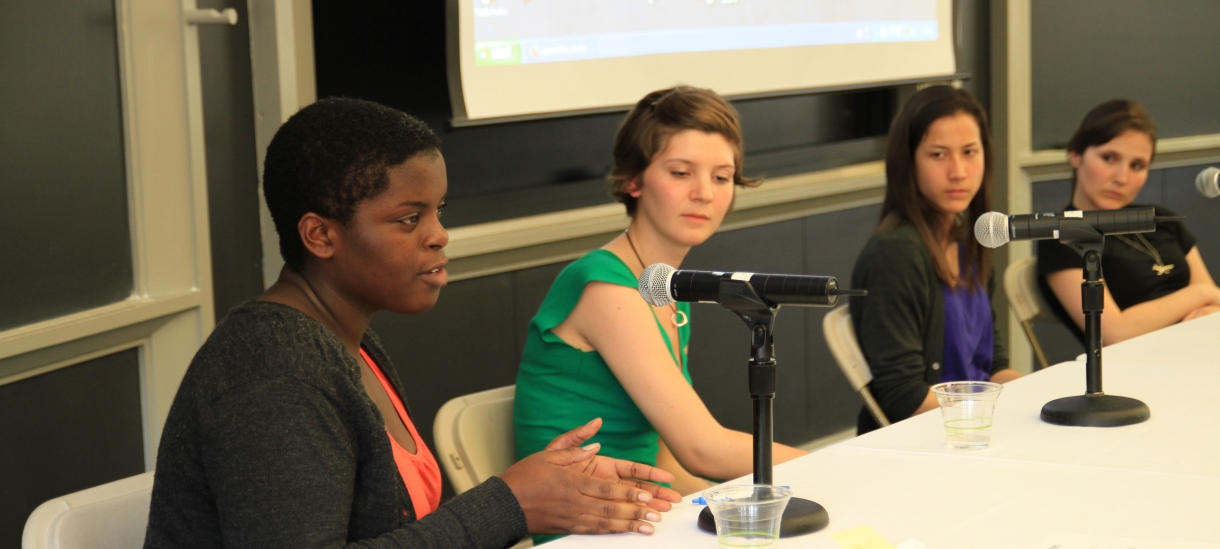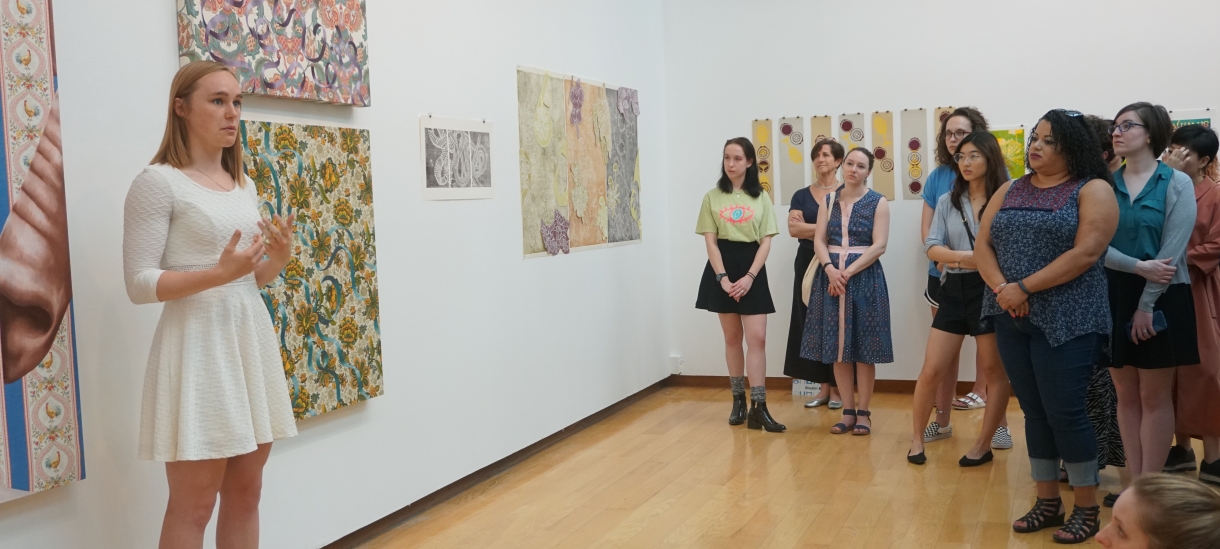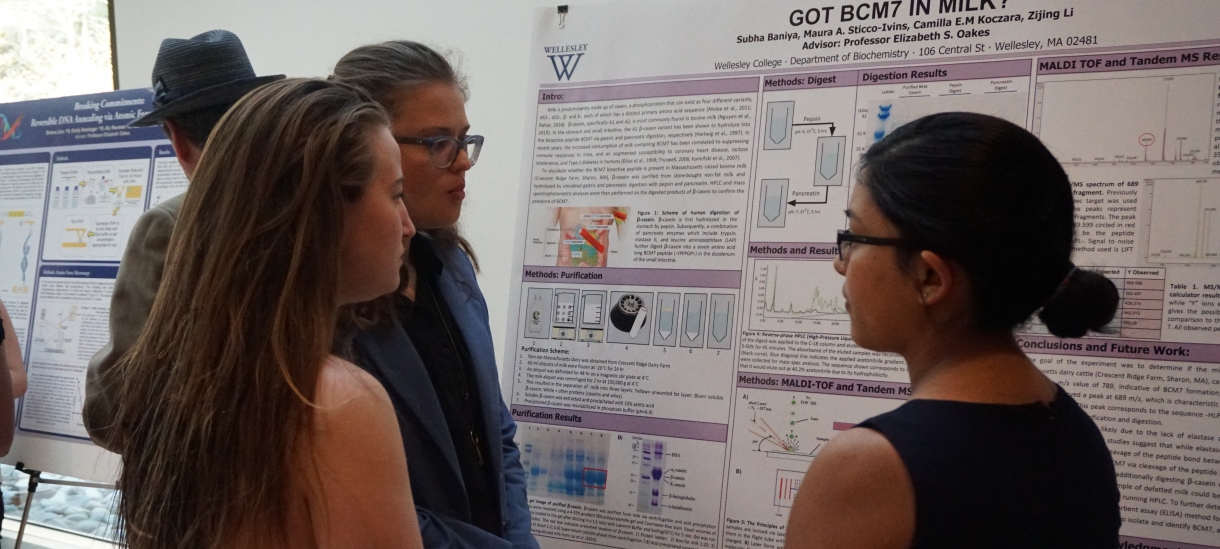Ruhlman
About
Welcome to the 28th Ruhlman Conference! The conference is made possible by the generosity of Barbara Peterson Ruhlman ’54. In 1997, Lee Cuba, Professor of Sociology and former Dean of the College, worked with Barbara Ruhlman to develop the plan for the Ruhlman Conference.
The conference is intended to foster collaboration among students and faculty across the disciplines and to enhance the intellectual life of the College. The event will provide an opportunity for students, faculty, staff, and friends to come together in celebration of student achievement.
The Ruhlman Conference celebrates intellectual life by sponsoring a communal, public event where students will have an opportunity to present their work to a wide audience. By providing an opportunity for public presentation of what is often a private, isolated activity; the conference will demonstrate that research can be part of the ongoing conversation in a community of scholars.
Schedule
Ruhlman Conference Program Info Links below:
Ruhlman Conference at a Glance
Ruhlman Conference Program: Classroom Presentation Abstracts
Ruhlman Poster Session Abstracts
Wellesley & FLAME International Symposium
8:45-9:15 a.m. Breakfast, Science Complex Faroll Focus Area
9:15-10:25 a.m. Session 1
10:25-10:45 a.m. Break, Refreshments served in the Science Complex Faroll Focus Area
10:45-11:55 a.m. Session 2
12:00-1:30 p.m. Luncheon, Science Complex Faroll Focus Area and Data Lounge
12:30- 1:15 p.m. Roundtable (SCI-H105): FLAME Symposium Faculty
1:30-3:00 p.m. Poster Session, Science Complex Faroll Focus Area (presenters to set up by 10:00 a.m.)
1:30-2:40 p.m. Session 3
2:40-3:00 p.m. Break, Refreshments served in the Science Complex Faroll Focus Area
3:00-4:10 p.m. Session 4
4:10-5:00 p.m. Ruhlman Closing Reception, Refreshments served in the Science Complex Faroll Focus Area
Reflections


Of her time at Wellesley, Barbara Peterson Ruhlman wrote in 2004, “Fifty-four years ago when I entered Wellesley, it was a dream come true… Four years at Wellesley were wonderful, rewarding, but not without their ups and downs, and much hard work, which helped me become a stronger, more confident person.”
Barbara was born to Thomas and Ethel Peterson in 1932 in Worcester, Massachusetts, and lived there for her first nine years. The family moved to Shaker Heights, Ohio, where Barbara graduated from Laurel School before enrolling at Wellesley in the class of 1954. A psychology major, Barbara lived in Homestead and Severance before spending her junior and senior years in Claflin Hall.
Barbara deployed her psychology degree as a hospital social worker before marrying former Air Force lieutenant Jon Ruhlman in 1955. Jon was a graduate of Purdue University with graduate degree from the University of Colorado. Together, Jon and Barbara raised two sons, Robert and Randall, while Jon pursued a career in business. Barbara took on numerous volunteer leadership roles in the arts, education, healthcare, and more in her community. Barbara and Jon avidly pursued their loves of sailing, global travel, and spending time with their two grandchildren together. Jon passed away in 2004 and Barbara passed on January 2, 2022, we remember them warmly and with gratitude.
All students may apply to present at the Ruhlman Conference. Attentive to the diversity of student interest and accomplishment, the Ruhlman Conference will include a variety of formats for the presentation of student work: papers, panels, posters, exhibitions, musical and theatrical performances, and readings of original work.
Ruhlman advisors support students as they prepare their presentations and posters. Every student applicant to the Ruhlman Conference is required to have an Advisor and the Advisor is asked to review the title and abstract for application PRIOR to the application being submitted. The advisor can provide advice on the content of the presentation and offer suggestions for making the presentation engaging and effective. Students can benefit a great deal from advisor advice on how much material to present; what to focus on; how to make use of visuals and presenation slides; and how to deliver their presentation. Ruhlman advisors are also important audience members on the day of the Ruhlman Conference.
All applicants (individuals, class, preformed-panels, and posters) must submit one abstract up to 150 words in length. Carefully review your abstract for typographical errors, punctuation, and grammar. You must have your Advisor’s review and approval prior to submitting your application. Presentation Application, the Fowler Public Speaking Contest Application, and the Poster Applications are on the Ruhlman Website (above).
The best presentations have a clear focus and an obvious sense of purpose, as well as substantive content.
-
Provide framing. Be sure to begin by briefly orienting your listener to the project and your role in it.
-
Be selective. Focus on one or two points about the work you did and the field you participated in, and illustrate these points with concrete examples and detail. If you are working with a panel of presenters, plan ways to distribute your focus amongst the panel members, and to make connections between the different approaches each of you takes. Consider the following questions to find your focus:
-
What is the most significant aspect of this project that you want to convey?
-
What was the most surprising and unexpected aspect of the work you did?
-
How did your perceptions of the field, work, topic, or people shift as a result of your experience?
-
How does this experience relate to your past or future academic, social and/or professional goals?
-
What do you hope those who attend your presentation will learn?
-
Plan to use your presentation to further your own learning. What do you want to record and remember about this experience? What do you want to be sure you don’t forget? What about your own learning will be meaningful to others?
All Ruhlman individual classroom presentation participants are eligible to enter the The Jacqueline Fowler ’49 Public Speaking Prize. The competition will take place in two rounds. In the first round, participants will submit a 3-minute video presentation of an abstract of their Ruhlman project, intended for an interested non-expert audience. The judging of the final round will be based on the finalists’ actual Ruhlman presentations, which will be designated in the program and scheduled so that the judges can attend all of them. The winner will be announced and the prize will be awarded at the reception at the end of the day.
The Jacqueline Fowler '49 Public Speaking Prize 2024 Application is due February 12th, at noon.
Research posters at professional conferences often present “work in progress.” The researchers present the framing of the project and workflow to date in order to get feedback from their peers that can help guide next steps in the project. This year Ruhlman is encouraging the submission of both works-in-progress posters as well as posters that present a more completed project. Guidelines for both submissions will be the same. The Ruhlman Committee hopes this explicit change will encourage students engaged in ongoing course based research and independent study to consider submitting a poster this year.
The Poster Session Application is linked above.
Ruhlman Presentations have several formats and you may apply as an individual or in a group upto 12 presenters. Due to scheduling constraints, students may take part in a maximum of one primary/individual presentation, one class/group presentation, and one Poster presentation. Both Students and Faculty may fill out the application for group/classroom Pre-formed panels. Please make sure to enter the presenter's and co-presenter 's names and majors as listed on the Wellesley College director for continuity. Make sure you have communicated with your co-presenters and only one of you is completing the application for the group. Like the individual applicants, the group panels should only submit one application with one abstract summarizing the presentation for the entire panel.
There are two variations of formats: A)15-minute and B) 60-minute.
A) 15-Minute Formats:
-
Talk (15 minute presentation with a 2 minute Q & A.) An individual student gives an oral presentation about some original research she has conducted. Two students may choose to present a single talk together, splitting the 17 minute time slot. Please note the committee will schedule all 15-minute “Talks” with related types of presentations to create a panel with a connected theme.
-
Short Performance (15 minute presentation.) An individual or group of students presents a short musical or theatrical piece.
-
Film Screening (15 minute presentation with a 2 minute Q & A.) An individual or group of students presents an original film or video.
-
Literary Reading (15 minute presentation with a 2 minute Q & A.) An individual student reads an original text, typically a series of poems or part of a short story.
B) 60-Minute Formats:
-
Pre-formed Panel Discussion (60-minute group presentation ending with a 10 minute Q & A.) A minimum of 3 students and maximum of 12 students apply together to discuss the same topic. Participants are either members of a class or have joined together to prepare material that will last for an entire 60 minutes. Please make sure only one member in the group fills out the application to prevent duplication.
-
Exhibition (70 minutes) An individual student presents original artwork in the form of drawings, paintings, sculpture, photos, etc. Presenters remain with their exhibits during the scheduled 70-minute session in order to help visitors understand the visually presented material. Exhibits also remain up for the entire conference and can be visited even when the presenters are not there.
-
On Location Presentation (60 minutes with a 10 minute Q & A) An individual student or group of students prepares a presentation that involves bringing the audience to a site on campus. For example, environmental studies students might prepare a presentation to be given at an ecological site, or architecture students might prepare a presentation to be given on a walk around the campus. Rain date contingency plans should also be made.
-
Interactive Teaching Presentation (60 minutes with a 10 minute Q & A.) An individual student or group of students prepares a presentation that is designed to teach the audience about a subject using interactive techniques that require audience participation.
-
Long Performance (60 minutes with a 10 minute Q & A.) A group of students presents a musical or theatrical piece.
Timing
-
Each of the four sessions is 70 minutes in length with 4-12 presenters. If you are part of a class or preformed panel, please time your presentation so that all panelists have equal opportunity to speak. The number of panelists determines the length of the presentation.
-
If you apply as “an individual 15 minute presentation” you will be grouped on a panel with 3 other presentations. Each presentation will be 15 minutes. If two students applied to present together they split their allotted 15 minute time frame.
-
Arrive early to your classroom the day of the conference. There is a break between each session, make sure you go to your assigned class at least 10 minutes prior to the start of the session to download your powerpoint presentation.
Tips
-
Visit your assigned classroom to practice your presentation and familiarize yourself with the room’s technology.
-
Meet with your advisor and fellow panelist to practice your presentation.
-
Don’t be shy, ask your friends and classmates to attend your presentation, use social media and get the word out about your presentation.
-
Dress professionally. You do not need to wear a suit but do wear appropriate attire for presenting to an audience.
-
With over 200 presentations scheduled for the day, many will want to see or hear particular presentations that are in different venues. Therefore it is to be expected that some people will be leaving or entering the room between, or even during, presentations.
-
Speak loudly enough to be comfortably heard.
-
Use pauses effectively: for punctuation, to change your thought, for emphasis, to allow a distraction to pass.
-
Use repetition: As a memory aid, to give interim summaries, to make key points clear.
-
Repeat a key point from a different viewpoint to give more of your listeners access to understanding your point.
-
Observe your audience to make sure you’re being understood.
-
Use gestures.
-
Keep your talk around the theme … don’t go off too far from it. Make sure your subpoints have a relationship to your theme.
-
Looking at your audience helps you see if they’re following you and allows your audience to connect with you.
-
Don’t just look at one person the whole time, nor constantly swivel your head like a pendulum.
-
Place your notes in a way that allows you to easily look up to see your audience.
-
Try to word your speech in a way that involves the audience, if that is appropriate. Use words such as “you” or “your” when appropriate, but don’t overdo it either.
-
In speaking, use sense stress and modulation. Variety in modulation makes for an enjoyable listening experience.
-
Use illustrations and/or examples when appropriate.
-
Use your conclusion to either summarize your argument (briefly) and/or rouse your audience to action, whatever is most appropriate. But don’t just end your presentation without giving the audience a clear idea of what needs to be done, happen, or how the information affects them.
Advise
Ruhlman advisors support students as they prepare their presentations and posters. Every student applicant to the Ruhlman Conference is asked to identify a faculty or staff member to perform this role. Advisors review and approve abstracts PRIOR to the student submitting their application (once submitted, there is no editing of the abstract), help students to plan their presentations, and may ask the student to present a “dress rehearsal” of their Ruhlman presentation, allowing for feedback and guidance on substance, structure and presentation style. The advisor can provide advice on the content of the presentation and offer suggestions for making the presentation engaging and effective. Students can benefit a great deal from advisor advice on how much material to present; what to focus on; how to make use of visuals and PowerPoint slides; and how to deliver their presentation. Ruhlman advisors are also important audience members on the day of the Ruhlman Conference.
Ruhlman Committee
Contact
Questions? Contact ruhlman@wellesley.edu



